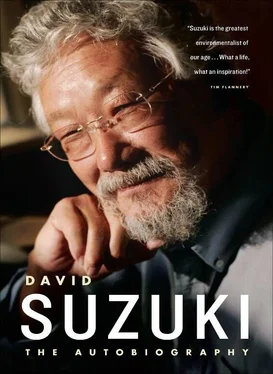The history of Australia over the past two centuries has been one of decimation of the Aboriginal people, a deliberate attempt to eliminate them by killing or through assimilation, and a climate of racism has led to enormous problems for the survivors. But as the twentieth century ended, Australians overwhelmingly wanted justice and reconciliation for the Aboriginal people, and it is my sense that there is a growing appreciation for their knowledge and art.
Islands, even large ones like Australia, impose boundaries and acknowledgment of limits. Being bound together by the constraints of water, land, and biodiversity, Australians have an opportunity to confront the major issues of our time as a unified country. Unlike Canadians, who must constantly refer to or compare ourselves with our neighbors to the immediate south, Australians aren't as psychically hampered. The twenty-first century truly offers the chance for Australians to realize their future as the lucky land.
ELEVEN
STARTING THE DAVID SUZUKI FOUNDATION
IN MY EXPERIENCE since I had become swept up in it in the late 1960s, the environmental movement worked for clean air, water, soil, and energy, for a world rich in diversity in which life flourished in abundance, and for sustainable communities and a way of living in balance with the rest of the biosphere. But to achieve those goals, we often had to try to stop destructive activities.
So it seemed ironic that we were always fighting against things — against testing underground nuclear explosives in Alaska, against drilling for oil in stormy Hecate Strait between Haida Gwaii and mainland British Columbia, against further damming the Peace River at site c in northern B.C. for hydroelectricity, against clear-cut logging, against pollution by pulp mills. As the chief executive officer of a forestry company once wrote, environmentalists seemed “anti-everything.”
As an academic with tenure at the University of British Columbia, a good grant, and a great group of students, I had a wonderful life. I had tremendous freedom, no time clock to punch, and no boss watching my every move. So long as I carried out my teaching and administrative work and directed my students, I could spend most of my time having fun, though to me that meant spending seven days a week, often till 1:00 or 2:00 in the morning, at the lab. The freedom that academia offers enabled me to get involved in both civil-rights and environmental issues, and I began to throw myself into controversies.
In the 1970s, as host of both Science Magazine on television and Quirks and Quarks on radio, I was in a good position to explore a variety of issues, especially those related to race and the impact of modern genetics and technological advances on medical care. I spoke out on them, supported the peace movement, and opposed the proliferation of nuclear weapons and the Vietnam War. In British Columbia, it was impossible to avoid being drawn into environmental battles over pollution, clear-cut logging, and mining.
As an activist I operated in a helter-skelter fashion, getting involved when asked or when I saw something that triggered my interest. I could be useful by signing petitions, writing letters of support, giving talks to help raise funds or highlight issues with the public. But I was unfocused, helping out when the opportunity presented itself and acting as an individual.
Being high-profile brought some danger. When we were in the heat of the battles over logging, a bullet was fired through the front window of my home, my office was broken into twice to get at my computer; once, in Haida Gwaii, while I was jogging along the road outside the logging village of Sandspit, a truck was turned at me and I was driven into a ditch. Tara and I often felt very vulnerable and alone, and we worried about our children's safety.
During my fourth and last year (1978–79) as host of Quirks and Quarks , Anita Gordon had become the producer, and she continued in that role when Jay Ingram took my place. In 1988, with environmental concern making headlines, Anita asked me to host a CBC Radio series on the subject. I agreed, and we received the go-ahead to do five shows that were broadcast in a series called It's a Matter of Survival . Traveling to conferences in North and South America, Europe, and Asia, I interviewed for the program more than 150 scientists and experts from many countries and fields about environmental problems and how the world would look fifty years hence if we carried on with business as usual. Most of those interviews were conducted in an intense period of about four months, and I could suddenly see with crystal clarity that the very life-support systems of the planet were being destroyed at a horrifying rate and on a grand scale.
This new perspective galvanized me with a sense of urgency that has only increased over the years. The radio series conveyed the magnitude of the problem as well as the uplifting message that by acting now we could avoid the fate we were heading toward. The series evoked an incredible response. More than sixteen thousand letters came in, most ending with the plea, “What can I do?”
Until then, my standard response to such a query had been, “I'm just a messenger telling people about the crisis that is happening. I'm afraid I don't have all the solutions.” But this time Tara said, “David, we've been warning people about the problems for years. This response shows we've reached a lot of the general public, but now people feel helpless because they don't know what to do. You've got to go beyond the warnings and start talking about solutions.”
I didn't like assuming that responsibility, but I could see she was right. It's one thing to hear a dismaying report, but it's another thing altogether to track down experts, organizations, and articles that might offer answers. In raising the alarm, I now also had to provide something that would help people take action if they were so motivated.
This truth was brought home to me by another experience. Noam Chomsky, the famed linguist at the Massachusetts Institute of Technology and one of the strongest critics of American foreign policy, gave a talk to a full house at the Queen Elizabeth Theatre in Vancouver. I chaired the event, and like the audience, I was enthralled by his analysis and insights. But during the question-and-answer period, he refused to recommend courses of action, organizations, or even books to read, saying that people had to find the material and make up their own minds. That helped me to realize that Tara was right: by informing and alarming people, I had a responsibility to suggest potential answers.
As well, many of our friends were anxious about strains on our ecosystems and had begun to challenge us to lead an initiative, perhaps to found a new organization. With their help, Tara and I drew up a list of about twenty “thinkers” who were committed to environmental issues but who had diverse skills and points of view; we invited them to a weekend retreat to discuss whether we needed a new, solution-oriented group. About a dozen people could make it, and in November 1989 they gave us three days of their precious time.
We gathered in the idyllic setting of Pender Island, one of the Gulf Islands in the Strait of Georgia between Vancouver Island and the B.C. mainland. The lodge where we met was close to the ocean and had an orchard and paths we could wander while discussing ideas. Tara and I were pretty naive about how to run such a meeting; at first we had no facilitator or written agenda, only questions and a sense of urgency. Luckily, Vancouver writer Stan Persky, known for his incisive analysis and his expertise at meetings, took over as chair.
I talked about my sobering and motivating experience working on It's a Matter of Survival and the enormous public response it received. Then I asked two questions: “Is there a need, an important role, for yet another environmental organization? And if the answer is yes, what would its focus be and how would it differ from other groups?”
Читать дальше


![David Jagusson - Devot & Anal [Hardcore BDSM]](/books/485905/david-jagusson-devot-anal-hardcore-bdsm-thumb.webp)









